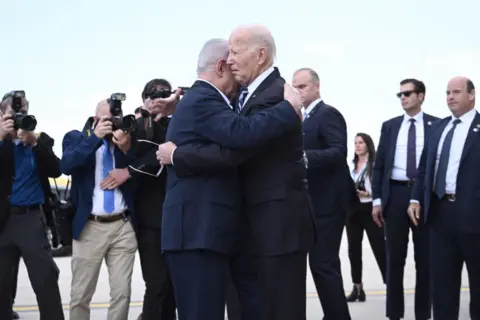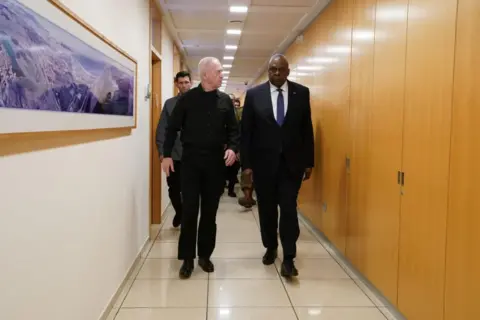Stakes are immense as Biden presses Israel to change course
 BBC
BBCThe US has a new diplomatic objective in the Gaza War - to convince Israel to scale back its military operations in coming weeks. This is a crucial test of the Biden administration, and whether it succeeds could help determine the next phase of the war - as well as the president's own political fortunes back home.
In public, the American effort to shape and restrain Israel's war has taken the form of advice rather than pressure.
US officials - from Mr Biden to Secretary of State Antony Blinken and Defence Secretary Lloyd Austin - have continually affirmed what they present as Israel's right to self-defence, and declared that a military operation which stops short of removing Hamas from power would only guarantee more attacks.
As the conflict wore on, they've also become more outspoken about the need to protect civilians, warning that not doing so would land Israel with a "strategic defeat".
Much of the world sees this approach as failing to temper a relentless bombing campaign that ranks among the most deadly and destructive this century.
US officials insist their strategy has been the most effective way for the administration to influence an Israel traumatised by the unprecedented Hamas attack and disinclined to hold back.
Yet American policy since that day has fractured Joe Biden's Democratic Party, lost him crucial support among young and Arab Americans and left the US looking isolated on the world stage.
 Reuters
ReutersSo far, President Biden's approach has achieved tangible, if limited, results.
Persistent and painstaking diplomacy cleared a path to allowing some humanitarian aid into Gaza early on in the war, and helped broker a seven-day ceasefire to encourage hostage releases and the delivery of more assistance to desperate civilians.
The Americans have certainly been very hands on. A steady stream of senior officials to the region has meant there's been someone in the room much of the time, having the difficult conversations face to face.
"These trips are important because we have constant issues that we're dealing with together with the Israelis," said a US official.
Each of Mr Blinken's three visits to the region has been a whirlwind of activity and he's been keen to highlight continued American efforts to free the hostages, increase humanitarian aid and ensure the conflict does not expand to consume the entire Middle East.
Progress on protecting civilians has been hard to see. This week the death toll in Gaza reached 20,000, according to the Hamas-run Gaza health ministry. The Hamas raid on southern Israel on 7 October killed some 1,200 people, mostly civilians, and saw about 240 taken hostage.
 Getty Images
Getty ImagesDespite winning assurances that Israel would take steps to do so, Mr Blinken has spoken about the "gap" between the intent and the results.
So January will be a crucial test of whether the administration can convince Israel to alter the dynamic of the war. It's pushing the Israelis to "de-intensify" military operations in Gaza and transition to more targeted tactics that produce fewer civilian casualties than the bombing-and artillery-driven campaign.
It is a request that Israeli Prime Minister Benjamin Netanyahu has not publicly endorsed, although his defence minister has talked about the war moving into different phases.
Critics of the American strategy say the US has been so cautious that it is effectively complicit in Israel's war. They say it should have more forcefully called for Israel to curtail a disproportionate military campaign and used the threat to withhold or set conditions on massive amounts of American military aid to rein in Israeli excess.
But Aaron David Miller, who worked as a Middle East adviser in the State Department for some 25 years, calls the notion that the US could pressure Israel to change its policy in this case "magical thinking."
"The battlefield dynamic is beyond our capacity to control, let alone micromanage," he says, noting that Israel and Hamas are pursuing irreconcilable goals.
 Reuters
ReutersMr Miller, who is now a senior fellow at the Carnegie Institute for International Peace, says history shows that Israel has responded to rare occasions of US pressure only when American demands are tethered to a result they can accept.
"Pressing the Israelis on a matter of critical importance to them without offering a compelling alternative or an outcome that they can rationalise and justify, never works," he says.
It's unclear if the "bear hug" strategy of publicly supporting Israel while preaching restraint behind closed doors will be enough to pull the Israelis across the line when it comes to scaling back the military campaign.
In the meantime the Americans are contending with growing international isolation.
Nowhere is this more evident than at the United Nations, where the US has opposed overwhelming demands for an immediate humanitarian ceasefire.
This week, with the UN warning of famine in Gaza, the US allowed the passage of a second Security Council resolution calling for more humanitarian access to Gaza. It did so after negotiating intensely to change language on the suspension of hostilities and mechanisms to monitor and speed up aid delivery.
The administration wants no suggestion of a ceasefire that would constrain Israel's ability to destroy Hamas's leadership and military capability.
But even some allies have been outspoken about this approach.
"The United States is losing respect, it's losing credibility as a powerful nation," former Irish President Mary Robinson, speaking on behalf of a group of global leaders known as The Elders, said in a recent interview on RTE News. "The United States has called for restraint, but [the Israeli government] isn't listening."
 Getty Images
Getty ImagesAnd Arab partners of the US are alarmed by the radicalising effect of Israel's destruction in Gaza.
"Israel is jeopardising the standing of the United States and other Western friends of ours in our region," said Jordanian Foreign Minister Ayman Safadi on a recent trip to Washington.
"It is not just killing Palestinians... it is also creating an environment in the region where the amount of hatred that's growing by the day, as a result of what we see unfolding in Gaza, is undoing 30 years of work that we all have invested in to normalise the idea of peace."
Mr Blinken has stressed that the regional and international community should also be pressing Hamas to lay down its arms and stop "hiding behind civilians".
But in comments at a fundraising event last week, President Biden appeared to acknowledge some of the administration's internal frustrations.
"(Israel) has most of the world supporting it," the president said. "But they're starting to lose that support by the indiscriminate bombing that takes place."
Mr Biden is also facing growing domestic pressure to take a stronger line against Israel. In a New York Times public opinion survey this week, only 33% of registered American voters approved of the president's handling of the Israel-Palestinian conflict. A plurality, 44% to 39%, said Israel should end its military campaign.
 Getty Images
Getty ImagesHeading into the 2024 presidential election year, the poll suggests the Biden administration is haemorrhaging support from key members of its electoral coalition. Among voters under 30, 46% said they sympathise more with the Palestinian side. Only 27% sided with the Israelis.
Some prominent liberal members of the Democratic Party have pushed a resolution calling for a human rights report on Israel's use of American weapons that could potentially suspend US security assistance.
Vermont Senator Bernie Sanders, a left-wing independent who's an important ally of Joe Biden's, is sponsoring the resolution and has called Israeli conduct during the war "reckless and immoral".
Separately, a group of House Democrats with national security backgrounds has written to the White House arguing that Mr Netanyahu's military strategy is not in the interests of either Israel or the US.
And there've been various expressions of dissent from within Mr Biden's own administration. More than 800 staff members have supported a letter calling for an immediate ceasefire, although most have done so anonymously, and only one has resigned.
"I felt a lot of dissonance between coming into work every single day and serving this administration that I had previously so proudly done, and then feeling this sort of vacuum where the influence of a call to a ceasefire (would be) massive coming from the US president and our boss," one staffer told the BBC.
Such sentiment underscores the difficult bind the US president finds himself in. Many world leaders, a significant number of administration insiders and about half the American public are increasingly unhappy with the current US strategy.
But if the president starts to get tougher with the Israelis, the other half of Americans that back Israel would almost certainly object - and there's still no guarantee that his current critics would be satisfied.
Scaling down the Israeli offensive is key. If it doesn't happen fast enough Mr Biden will have to seriously consider his next step.
Especially as the calendar will soon flip to 2024 - the last year of his first presidential term. Domestic politics, always a factor in US foreign policy, will increasingly become a pressing concern for the president.
For a man who promised a steady hand at the tiller after four years of Donald Trump's sometimes tumultuous foreign policy, the Gaza War has proven to be a formidable - and potentially grave - challenge to his political fortunes.

